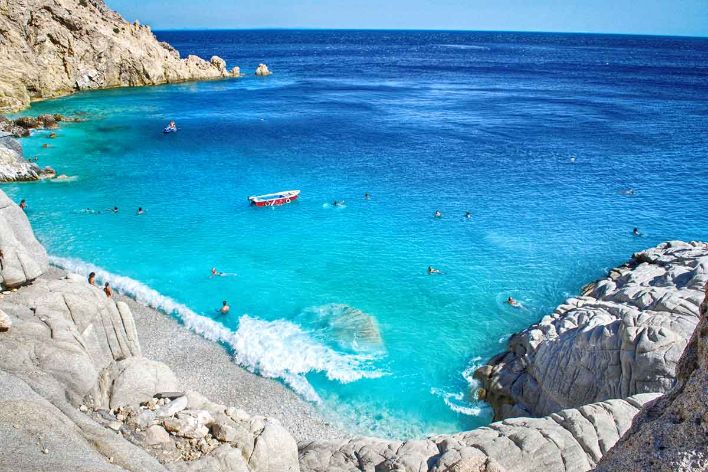Blue zones: The longevity paradises

One hundred years, an age unattainable for most people today. However, there are certain areas in the world that are paradises for centenarians. To discover its secrets a research team led by Dan Buettner set out to learn and study the five places on earth where people tend to live much longer than the rest of the world. These places are known as the "blue zones."
Ikaria, Greece

In this small Greek island, the elderly live like gods: they take a nap every day, cultivate a garden regularly, eat well and even remain sexually active.
With one in three icariotes reaching the age of 90, this population tends to live 10 years longer than the rest of the inhabitants of Europe and America.
Their usual diet is very similar to the popular Mediterranean diet, which consists of basic foods such as olive oil, red wine, fish, herbal infusions, unpasteurized honey, chickpeas, peas, lentils and limited amounts of meat, sugar and dairy products (with the exception of goat's milk). The health benefits that are claimed in the Mediterranean diet range from a lower risk of heart disease to better mental health, key factors that can help extend the lives of these people of the Greek islands.
Okinawa, Japan
.jpg)
At 83.4 years, Japan has the longest life expectancy in the world. Currently, there are more than 50,000 japanese centenarians and it is estimated that by the year 2050 there will be more than one million people over 100 in the country. The island of Okinawa, in southern Japan, has the longer life expectancy across the country. Here, men live around 84 years, while women in the area reach almost 90 years. If we compare women in North America with those in Okinawa, women on the japanese island are three times more likely to reach the century of life than women in North America.
These elders are active to stay alive. Their foundation for longevity is the firm belief in keeping social relationships with friends for life, finding a vital purpose that keeps you busy and eating small portions of food.
The basic foods in Okinawa differ from those of the rest of the japanese country. The inhabitants of Okinawa consume a diet based on vegetables, especially green leafy ones and potatoes, along with fish, which contains omega 3 fatty acids. The locals also practice hara hachi bu, which is the Confucian teaching that promotes eating until you are full by 80%.
Nicoya, Costa Rica
.jpg)
Costa Ricans generally live long lives, averaging 78 years, thanks to their health system. But a region on the Nicoya Peninsula is home to people who at 60 years old are seven times more likely than their Costa Rican compatriots to reach 100 years.
Although Nicoyans live two or three years longer than other Costa Ricans, their diets create higher rates of blood pressure and obesity compared to the rest of the country. The people of Nicoya tend to eat hearty breakfasts and small dinners. The staple foods in their diet include lots of pumpkin, eggs, black beans, corn tortillas, more local fruit than any consumed in other "blue zones," and meat (mainly chicken and pork).
The low rates of heart disease and strong bones in the elderly in Nicoya may be due to the high calcium content found in local water.
Villagrande Strisaili, Sardinia, Italy
.jpg)
Imagine a place without residences for elderly people, where they remain active and enjoy a moderate daily intake of red wine. Well, that place exists and it's called Villagrande Strisaili.
Located on the Italian island of Sardinia, this small village hosts a population in which 1 in every 600 people reaches 100 years. That number may not seem like much at first, but when compared to other places, it's impressive. The criterion to become a "blue zone" is to have a centennial rate that is three times higher than the national average, and Villagrande complies.
Men tend to survive women in this area and that could be thanks to work in the field, since the vast majority have been pastors or farmers. Since childhood, they have become accustomed to doing a lot of physical exercise, one of the key factors to live longer.
Some basic foods in the diet of these centenarians are homegrown products (such as eggplants, tomatoes and beans), sheep's cheese (made with sheep's milk fed with grass) and local wine (made with Cannonau grapes) that is rich in polyphenols and it is favorable for the health of your heart.
Loma Linda, California
.jpg)
This small town in Southern California is home to approximately 9,000 followers of the Seventh-day Adventist Church, approximately half the population. Seventh-day Adventists avoid "biblical" foods like pork, consume other meats and discourage smoking, caffeine, alcohol and spices. It is believed that this lifestyle is one of the main reasons why this population lives four to ten years longer than the other inhabitants of California.
Most of these inhabitants follow a vegetarian diet, but also consume healthier alternatives such as whole grains, lots of water and nuts in their daily routine. In addition, they surround themselves with other followers of their church. This socialization helps relieve stress and reinforces the healthy lifestyle that everyone practices.
Although each blue zone has its own way of life, older people stretch it by living it to the maximum and in a simple way. Physical activity tends to involve natural movement with enjoyable pastimes such as walking or gardening. Awakening each day with a sense of vital purpose seems to help bring these elders to a long life. Eating wisely by choosing healthy alternatives or simply not eating too much also works. Finally, it is important to maintain a strong relationship with family and friends to live a long life.
Is this really the longevity secret?
